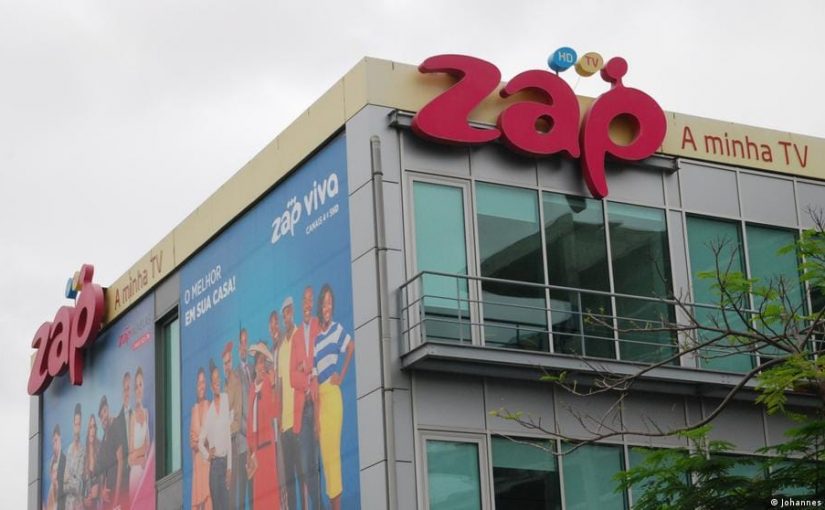Scientists try to prove link between Amazon gold mining and disabilities in babies
Angola: Ministry to manage ZAP Media and Finstar, take back ex-employees

File photo: Lusa
The office of Angola’s Attorney General has announced the handover of the management of the companies ZAP Media S.A and Finstar to the Ministry of Telecommunications, Information Technology and Media (MINTTICS), which must now ensure that employees are taken back on who were laid off from the ZAP Viva television channel.
In a statement released on Thursday, the office of the attorney general notes that the shares in ZAP Media S.A and Finstar – Sociedade de Investimentos e participações S.A. were seized in 2019, and at the time the boards of directors of these companies were constituted as trustees, but that “due to the collective dismissal of the workers of Canal ZAP VIVA, carried out by the above-mentioned bona fides depositary, the National Asset Recovery Service requested in Court that it be replaced by the Ministry of Telecommunications, Information Technology and Media, and this request was granted.”
Thus, it continues, “the new Trustee is in charge of reintegrating the dismissed workers, as well as practising acts of prudent management for the maintenance of the companies.”
On 12 January it was announced that the ZAP Viva television channel, which had been suspended in Angola since last April, would close and lay off hundreds of staff, according to local media reports.
It would thus be the second channel to close its doors following a decision by the ministry to force the suspension of channels citing failures to confirm with legal requirements. Vida TV ended its activity in July 2021, throwing over 300 professionals out of work.
Angolan artists and public figures have since expressed their solidarity with ZAP’s former employees and lamented the closure of the channel, as has businesswoman Isabel dos Santos, owner of telecommunications operator ZAP, whose stake in the company were seized in December 2019, at the request of the Luanda provincial court.
On her Instagram account, dos Santos – who has been living outside Angola since her father, José Eduardo dos Santos, a former president of Angola, stepped down, and who is facing several criminal proceedings in the country – expressed “affection and admiration” for her colleagues at ZAP and said that she was “heartbroken” at its fate, expressing hope to “return one day”.
ZAP Viva’s workers, for their part, made a prayer of thanks that circulated on social media for the opportunity to work and support their families over the past nine months.
In September last year, the operator had announced a gradual process of redundancies following the suspension of the ZAP Viva channel, saying it was carrying out “the necessary steps to resume broadcasting in national territory,” although with “no timeframe for resolution”. Without mentioning how many jobs were at stake, ZAP said that it was “taking several measures to optimise different operational areas” – including human resources allocated to its ZAP Studios Unit, which produces television content.
ZAP is a joint venture between Portugal-based telecommunications company NOS (which has a 30% stake) and SOCIP – Sociedade de Investimentos e Participações, S.A. (100% controlled by Isabel dos Santos) that provides satellite television to Angola and Mozambique. The ZAP VIVA channel is available in Portugal via NOS.
On 21 April last year, Angola’s government suspended the channels Record TV África, ZAP Viva and Vida TV, citing their failure to comply with legal requirements; it also suspended the provisional registration of newspapers, magazines, news websites and radio stations with no effective activity in the last two years, a list of which was never made public.
Pay-TV providers TV CABO, SA, DSTV ANGOLA, SA an, FINSTAR – owner of ZAP TV, were duly legalised, but continued to emit the channels ZAP Viva, Vida TV and Rede Record without the required registration, leading to their suspension.
At the time, the ministry said that its action was aimed at adjusting the process of granting the definitive registration for exercising the activity to media companies and gave no further explanation to date.
Organisations including the Union of Angolan Journalists and the local branch of the Media Institute for Southern Africa (MISA-Angola) expressed concern over the decision, which they said threatens the plurality of information in Angola, which now has only broadcasts by public channels controlled by the Angolan State, questioning the laws invoked for the suspension.












Leave a Reply
Be the First to Comment!
You must be logged in to post a comment.
You must be logged in to post a comment.